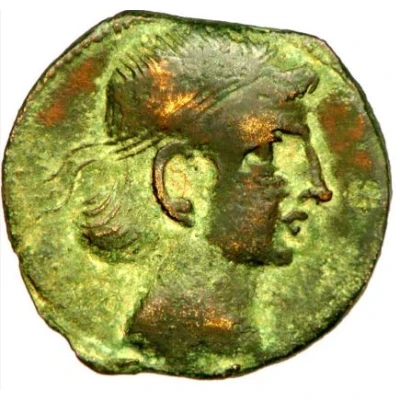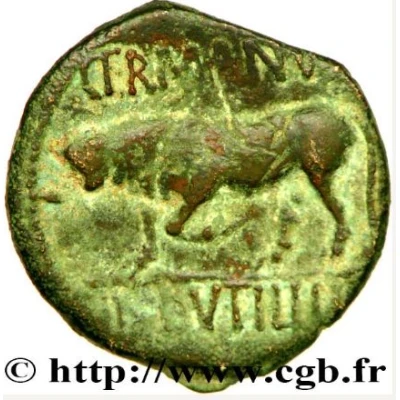


© CGB
Bronze with cornupete bull GERMANVS INDVTILLI 20 BC - 10 BC
| Bronze | 3.25 g | 17.5 mm |
| Issuer | Reims (Gallia Belgica) |
|---|---|
| Emperor | Augustus (Caius Octavius) (27 BC - 14 AD) |
| Type | Standard circulation coin |
| Years | 20 BC - 10 BC |
| Value | Quadrans (1⁄64) |
| Currency | Denarius (49 BC to AD 215) |
| Composition | Bronze |
| Weight | 3.25 g |
| Diameter | 17.5 mm |
| Thickness | 2.1 mm |
| Shape | Round (irregular) |
| Technique | Hammered |
| Orientation | Variable alignment ↺ |
| Demonetized | Yes |
| Updated | 2024-10-06 |
| Numista | N#184017 |
|---|---|
| Rarity index | 87% |
Reverse
Horned bull on the left, on an exergue line; beaded circle around.
Script: Latin
Lettering:
GERMANVS
INDVTILLI
Comment
This type was previously allocated to the Treveri. We owe Jean-Marc Doyen, a researcher at the University of Lille III, to have reassigned this bronze to the Remi."This sometimes classic style bronze, made in an alloy containing an average of 12% zinc (orichalcum) is a semis and not a quadran as has long been assumed. It is cut to 1/108th of a pound (9 dozen) The distribution map shows a circulation fairly faithfully following the limits of the new province of Gallia Belgica, for which it serves as an additional coinage. Traditionally classified among the Gallic coins, this bronze is in fact a provincial issue made in Reims under imperial control by a Remian prince named Indutillus".
Interesting fact
One interesting fact about this coin is that it features a rare and unique design element - a cornupete bull, which is a mythical creature that is half-bull, half-goat. This design was only used on a small number of coins during the reign of Emperor Augustus, making it a highly sought-after collector's item among numismatists.